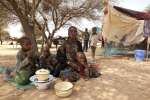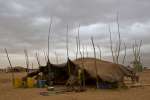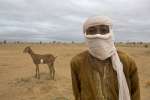Malian refugees in Burkina Faso restore their lives building on their traditional skills
News Stories, 9 October 2015
OUAGADOUGOU, Burkina Faso, Oct 9 (UNHCR) – By 55, Alouda had hoped he would be safe and happy, living in his own home. Instead, he is in exile having fled violence and human rights abuses in Mali four years ago.
"The conflict forced us to get away from our native region, Timbuktu, and seek asylum abroad," he said. "My wife, my five children and I have taken refuge in Burkina Faso since then."
Today, in the capital of Ouagadougou, Alouda lives in a courtyard together with six other refugees and a Nigerian family.
Since early 2012, an estimated 34,000 Malians like him have had to escape their homes, leaving everything they know, to make the dangerous journey to safety in Burkina Faso. Another 100,000 have found refuge in Mauritania and in Niger, and some 62,000 remain displaced within Mali.
UNHCR and its partners have been welcoming the refugees and providing legal protection, as well as access to drinking water, shelter, education and health. They are also supporting sustainable micro-enterprises that offer opportunities for self-reliance and integration, thanks to the help of the IKEA Foundation.
Alouda belongs to a traditional community of blacksmiths and is one of the refugee artisans currently supported by UNHCR. "Our craftwork is handed on from generation to generation," he explained. "As a child, I trained myself with my father who also learned from his father."
Back in Mali, he would walk hundreds of miles away into the desert to search for the best raw materials. The effort was nearly always worth it.
"We used to sell our products to tourists. Before the outbreak of the war, we received enough orders to keep us working every day. But as violence resumed, the tourists were the first to flee away from our regions. Then we had no more livelihood."
Even in Burkina Faso, Alouda was determined to continue. But then, in March 2015, UNHCR was forced to close Saag-Nionigo camp, where he had been living with his family and around 2,000 others.
"This camp was the right place for me to be," he recalled. "I could easily get to the capital city where raw material is available and the demand is high. But when it closed, we were transferred to the camp of Mentao, some four hours by car north of Ouagadougou, in the Sahel region."
There, Alouda and his family joined 13,000 or so other Malian refugees. "The problem is that I cannot continue my activity in this camp," he continued. "There are no tourists in this region, so there are no orders. Therefore, I most often stay here in Ouagadougou."
From the design of his products to the final touches, Alouda applies rigorous method, precision and delicacy.
"I prefer working with the leather. It takes calm, meticulousness and patience to apply the hide on wood. One must not hurry! It took me time to understand it. Even today I still consider myself as a learner… I always pay attention to my brothers' advice."
To make the most of the skills of refugee craftsmen, UNHCR helps them to organise associations. The tasks are shared according to each craftsman's competence, in order to achieve mass production of an article. It is a kind of assembly line work – Tuareg style.
"Since the creation of our association, I have specialized in the application of hide to wood, and in the finishing," explains Alouda. "Bebe is my team mate who works upstream on the product. He cuts the plywood into slices and pastes the fabric on them. I learn much from him... Together, we make a good team!"
Bebe, 40, has also left his family in Mentao camp to work in Ouagadougou. Just like Alouda, the plywood sawing, skin tanning and hammer blows are his most valuable livelihood.
"I left everything in Mali," he said. "The only luggage I brought along with me is my know-how... And to be able to make use of this even while in exile is a piece of luck for my family and me! The income we make from this activity is first used to buy raw materials. Then, some of it is used to support the family: we send the money into the camp mainly to feed our children and to enroll the older ones in high school. In case some is left, we keep it here for our daily life expenses."
They train and work in team. They invest and pursue efforts. They share and take care. By building on their traditional skills, Alouda, Bebe and the other talented Malian refugees in Burkina Faso have certainly adopted one of the best approaches to rebuild their lives.
Paul Absalon, Burkina Faso



















































